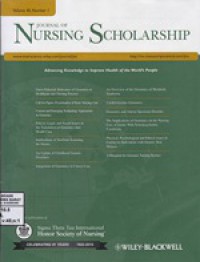
Jurnal
Scientific Misconduct: Also an Issue in Nursing Science?
Purpose: Scientific misconduct (SMC) is an increasing concern in nursing science. This article discusses the prevalence of SMC, risk factors and correlates of scientific misconduct in nursing science, and highlights interventional approaches to foster good scientific conduct.
Methods: Using the “Fostering Research Integrity in Europe” report of the European Science Foundation as a framework, we reviewed the literature in research integrity promotion.
Findings: Although little empirical data exist regarding prevalence of scientific misconduct in the field of nursing science, available evidence suggests a similar prevalence as elsewhere. In studies of prospective graduate nurses, 4% to 17% admit data falsification or fabrication, while 8.8% to 26.4% report plagiarizing material. Risk factors for SMC exist at the macro, meso, and micro levels of the research system. Intervention research on preventing scientific misconduct in nursing is limited, yet findings from the wider field of medicine and allied health professions suggest that honor codes, training programs, and clearly communicated misconduct control mechanisms and misconduct consequences improve ethical behavior.
Conclusions: Scientific misconduct is a multilevel phenomenon. Interventions to decrease scientific misconduct must therefore target every level of the nursing research systems.
Clinical Relevance: Scientific misconduct not only compromises scientific integrity by distorting empirical evidence, but it might endanger patients. Because nurses are involved in clinical research, raising their awareness of scientifically inappropriate behavior is essential.
Availability
No copy data
Detail Information
- Series Title
-
Journal of Nursing Scholarship, Volume 46, Number 4 July 2014
- Call Number
-
(05) 610.5 WIL j
- Publisher
- Malden : Wiley-Blackwell., 2014
- Collation
-
Hlm. 271-280
- Language
-
English
- ISBN/ISSN
-
1527-6546
- Classification
-
(05) 610.5 WIL j
- Content Type
-
-
- Media Type
-
-
- Carrier Type
-
-
- Edition
-
Volume 46, Number 4
- Subject(s)
- Specific Detail Info
-
-
- Statement of Responsibility
-
-
Other version/related
No other version available
File Attachment
Comments
You must be logged in to post a comment
 Computer Science, Information & General Works
Computer Science, Information & General Works  Philosophy & Psychology
Philosophy & Psychology  Religion
Religion  Social Sciences
Social Sciences  Language
Language  Pure Science
Pure Science  Applied Sciences
Applied Sciences  Art & Recreation
Art & Recreation  Literature
Literature  History & Geography
History & Geography